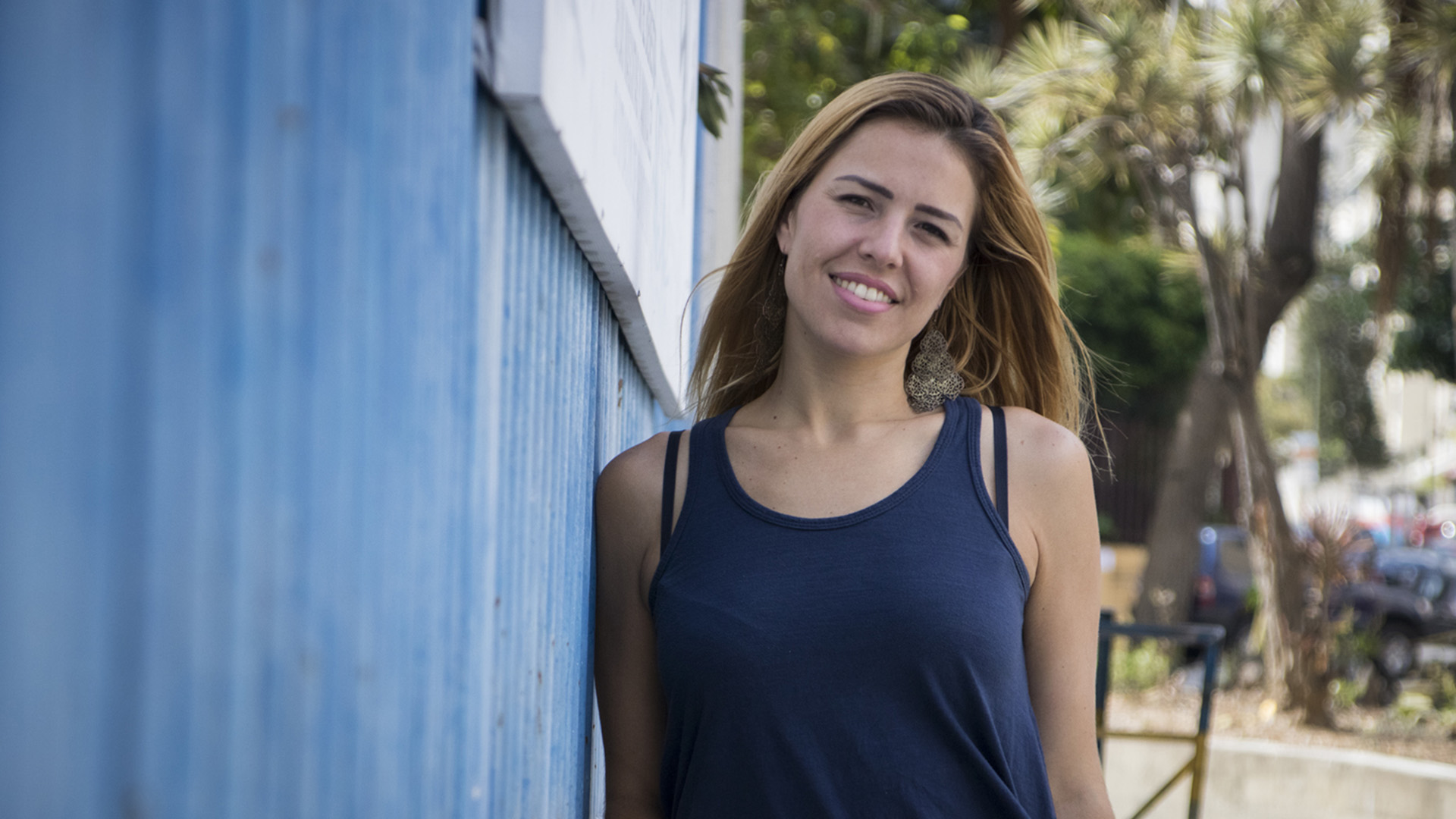

Andrea González spent 2 years, 4 months and 6 days imprisoned for a crime she did not commit. That equals 859 days, 20,628 hours, if we consider she was arrested one day in the morning and released one day at night. She was taken to El Helicoide —one of the political prisons of Nicolas Maduro’s regime in Venezuela—, being 29 years old and was released being 31. She was taken there being a confectioner and was released as an ex-political prisoner. She was taken there wanting to emigrate, and when she was released, she wanted to stay in Venezuela.

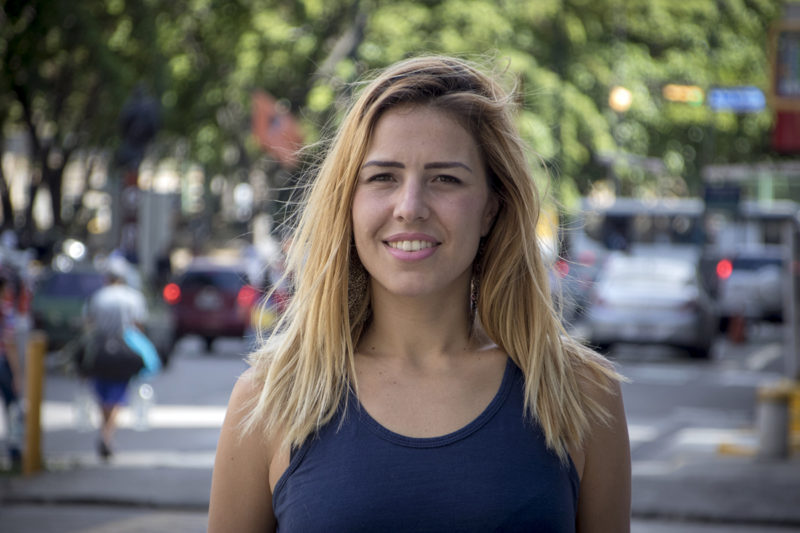 Photographer: Rayner Peña
Photographer: Rayner Peña
When the new commissioner allowed to open the cell window, Andrea was sleeping. That day she slept in, while the breeze ventilated the 50 square meters she shared with 31 other women. It had been eight months. She wasn’t sleeping on the floor anymore, but in a bunk bed. That day she slept in. Maybe she slept better too.
She woke up, startled.
—Andrea, they opened the window.
Andrea ran and stood on the tips of her toes, facing that barred hole, barely few square centimeters big. She felt the breeze, she smelled the street. It was the evening breeze, close to dusk. She knew it because the morning breeze and the afternoon breeze smell different.
She cried. Andrea Gonzalez cried inconsolably. After eight months imprisoned in El Helicoide for a crime she did not commit, she finally could feel the breeze.
It was Monday, August 17, 2015, when officers of the Bolivarian National Intelligence Service (Sebin) knocked on the door of Andrea’s apartment. She was still in her pajamas. They asked her to go with them to Helicoide —one of the political prisons of Nicolas Maduro’s regime in Venezuela— to be interrogated about the murder of her friend Liana Hergueta, found dismembered inside a car on August 7, 2015. She thought it was a normal, legal procedure. She would go there, give her statement and go back home. She changed her clothes. She said goodbye to Danny, her then boyfriend, and left.
In the car, officers were nervous, she recalls. Restless. They were whispering to each other, seeing her out of the corner of their eyes. Did they know what awaited her? Or did only Jose Perez Venta, the “cooperating patriot” who killed Liana Hergueta and accused Andrea of wanting to murder the daughter of Diosdado Cabello, then Speaker of the National Assembly know what would happen? They are called “cooperating patriots”, that’s how the government calls its snitches.
A gate separates El Helicoide parking lot from the rest of the Roca Tarpeya community in Caracas. Then, inside, an armored door separates the parking lot from the cells. It also separates people from life, from plans, facing them with the screams and rage.
That afternoon, Andrea called Danny to pick her up. But, until December 23, 2017, neither of them would leave Sebin facilities.
A total and sad isolation of more than 10 days preceded her move to the large cell. That day, when she joined the group of prisoners, Andrea knew that she would not leave the Sebin soon. And she cried every day, until her body was exhausted.
—Andrea, go to the window! Go to the window! —other prisoners shouted at her.
She was taking a shower, but she wrapped himself in a towel and ran to the window. From there, for the first time since she was in El Helicoide, she saw her grandmother, Alexandra Jukisz.
Andrea and Alejandra, her sister, were raised by her grandmother. First in San Antonio de los Altos, in Miranda state; then in Tenerife, Spain. But when Andrea reached adulthood, she returned to Venezuela to resume a teenage love, while her sister and grandmother stayed in Spain. When she was arrested, her family considered it was not convenient for her sister to travel to Venezuela, so Alexandra, the grandmother, did not hesitate to go herself.
She spend almost three months trying to see Andrea. The threat of the granddaughter to commit suicide caused the guards to allow them to see each other from afar.
—My girl, I’m going to see you. I’m going to see you. She shouted.
Day after day they both cried, several meters away from each other. But the day when they could hug each other finally came. It was already November 17.
—My little one, my baby. I would like to take your place and stay here, so you do not spend even one more minute in here —said the grandmother while she cooed Andrea. Andrea’s voice breaks when she recalls it.
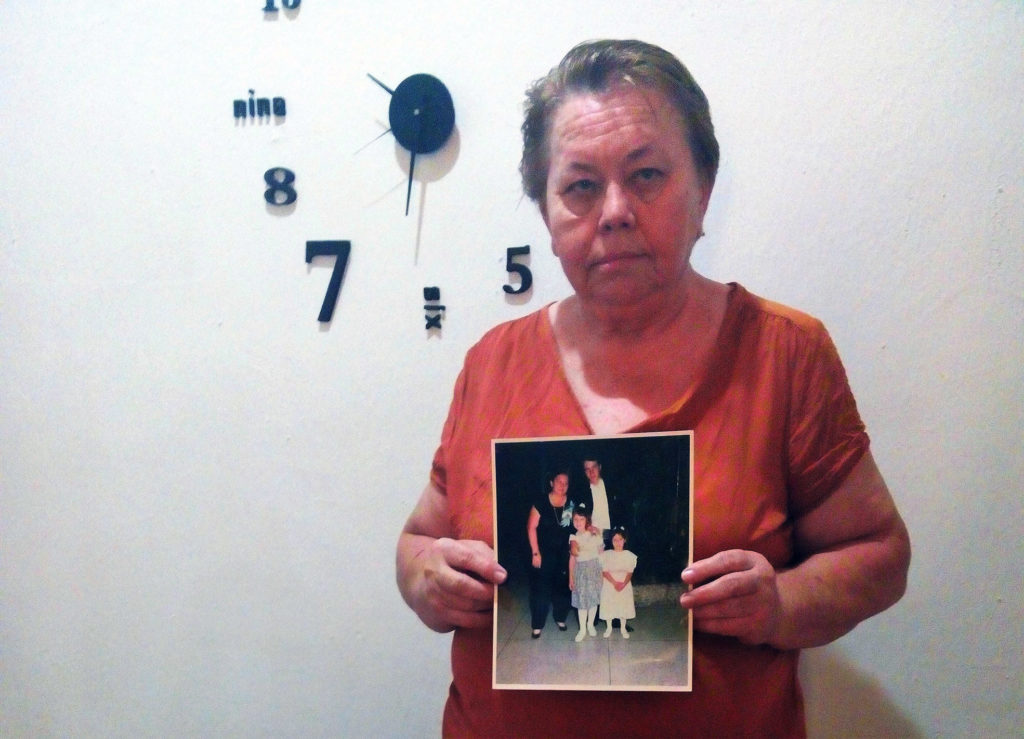
Andrea can render a better description of El Helicoide from inside. When she talks about how it looks on the outside, what the entrance looks like, she hesitates a bit. But not inside. It’s like the speleologist who knows how to walk through a cave without a flashlight.
She was locked in two cells. The big one, which was “crowded like a pig pen”, and the small one where “they thought I would not resist the stress”. She was taken to the latter when she went on a hunger strike. Curiously enough, the one where she was taken so she could feel more comfortable was a punishment cell in the past, the antechamber of an old examination room.
It had no windows. It had no bathroom. It had no light.
You could only go to the bathroom, on the hallway, when the guards opened the gate. If Andrea or her two cellmates wanted to urinate, they would do it in plastic cut-out containers, which they then emptied into another large container, and filled it until the guards decided it was time for the women to relieve their bodies. If they wanted to excrete, they did it in bags with newspaper. They took baths with a bucket. That’s how it was for nine months.
But Andrea hardly mentions these moments when asked. She rather prefers to remember the kindness that was nurtured in isolation.
—Believe it or not, you can have good times wherever you are. Human beings are able to adapt to make the best of any situation.
She remembers those coffee mornings with her friends, when they talked about life. “It was family-like, rich, nurturing.” She remembers that carnival when they threw a bucket of water from their cell to “the boys,” other political prisoners. The men were on their way to the bathroom, and one of them came running back with a big bucket of water and soaked the girls with it.
—Andrea, get ready to wet them when they return, said the guard that was her accomplice on that carnival fun, who opened the gate for a few seconds. When the guys walked in front of the cell, one of the girls ran in their direction and avenged the others. Andrea does remember that very well.
The cell, eventually, changed its appearance. It got painted, it got a light bulb, a bathroom and an air conditioner unit, provided by their families. It was more comfortable now, but it took away all the girls’ freedom. “We did not have to go to the bathroom in the hall anymore. They did not open the gate again.”
Except when they were taken to the courtyard to get some sunlight.
But Andrea did not always want to go. On June 12, 2017, she wrote to his sister Alejandra in a letter:
I think I told you that I have not been in the sunlight for 10 months, and I have no windows, so just imagine. Everyone insists that I must go to the courtyard, but for me it is a horrible experience. It is the moment in which I feel more imprisoned. All those guards looking at you, pushing you, pointing at you with rifles, and us, just circling like cattle in a 6 x 4 m2 pen. For me, it is more traumatic than it is therapeutic.
Understand, accept, and go on.
—Being imprisoned is like being on pause. You are not dead, but you do not live either. You are on pause. You are there, and they control you: the government does. Many of the guards only do their job, like everyone else. Many do not agree either. They tell you. When I decided not to be angry anymore, I understood. I understood them.
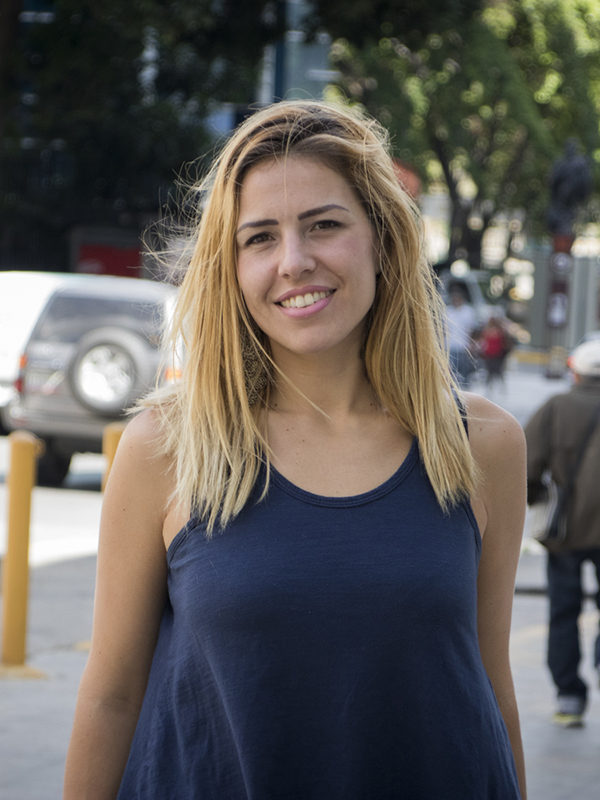
Andrea has the word “forgiveness”, in English, tattooed on her left wrist. She got the tattoo four months before being arrested. “Forgiveness”, it says, in multi-colored letters. Both the feeling and her tattoo reached the peak of their meaning in El Helicoide.
The 3 x 6 meters cell where she was locked until her release had an electric stove, which they took turns to use. Being a confectioner, as she was before being accused of planning a murder, during her imprisonment she use to make sweets, toffees. The guards used to go to her, attracted by the sweet smell, with a cup in their hands. This loving care was rewarded with sweets from their towns, that they would bring her when they went on leave to visit their families.
She used to have conversations with them. She even forged contradictory friendships with some of those guards. This is contradictory for those who thought she could not relate to her tormentors. But she knew – and she says it often – that they were not the ones to blame. However, she does not hold a grudge against the real culprits either. They will repent one day, she says.
Andrea is naturally sweet person. She laughs hard. She is cautious when walking on the street, but she’s not afraid. She trust people a lot. She stands up to the smallest injustices. She gets goose bumps and her smile fades away when someone comes to her, begging for food. She confesses that she cannot get used to this Venezuela that she found outside El Helicoide, after more than two years of imprisonment. But she quickly collects herself, or at least, she tries. She laughs again. It would be impossible to guess that she served time in prison.
-Other prisoners laughed at me when I told them that I was going to celebrate Christmas as a free person. But whenever I make a prediction, it happens. I had told them: on December 24th I will be free. And on the 23rd, about 8 o’clock at night, they delivered the news.
She always speaks with a lot of conviction, with an excessive, but sincere hope. “You will see, I’m going to get someone to support them. You will see, I get this medication. You will see that he is going to answer me. You are going to see that this will end soon.”
And this attitude is infectious.
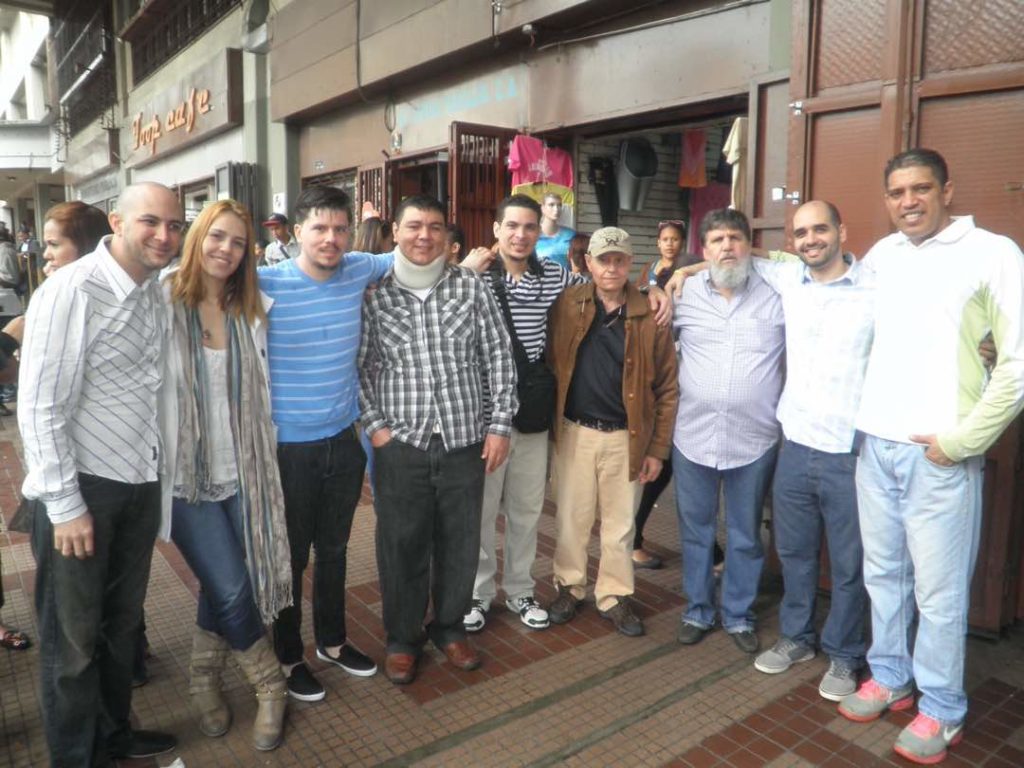
What does a political prisoner do when released after 2 years, 4 months and 6 days? Andrea went back to her apartment and locked herself. Alejandra, her sister, sensed through a WhatsApp chat that “she was having trouble adapting to freedom”.
But something bigger was happening. The biggest thing that had happened to Andrea in the last 859 days of her life (of absence, of pause): she was lying down on her sofa, in her apartment, facing her window, looking at the sky.
Andrea González spent two days looking at the sky. By day, the clouds. At night, the moon. How much she had missed the moon! In El Helicoide, being unable to see the moon was her reminder that she was a prisoner. One day she cried for the moon. She wept as only someone who can no longer look at the sky, day or night, can mourn.
Andrea, who until August 17, 2015 was a confectioner (but not any confectioner, but one that, according to then governor of Aragua State, Tarek El Aissami, planned to assassinate Diosdado Cabello’s daughter), now she decided to start with a bread making business.
She wakes up very early in the morning, she starts the ovens and starts her day. She has been doing it for months, since she got out of prison. At the end of the day, trial and error renders results. She likes the bread she is baking and beginning to sell. She bakes in the mornings, and goes out to offer her product it in the afternoons. With the leftovers, she makes bread puddings that she donated to the nursing homes she often visited before being arrested.
That is what her life revolved around: helping others. She was even trying about adopting a child, but process could not be completed. At least, she did not have to deal with being an absent mother while being in prison.
Before being arrested and accused by Jose Perez Venta, Andrea was planning to leave the country. She would immigrate to Spain, where her sister and grandmother were waiting for her, since all of them have dual citizenship. Now, that idea seems to be far away.
—Why would I leave my country? They controlled me for 2 years, 4 months and 6 days. Why should I give them more control? I would like to visit my grandmother, my sister, my family. But there is the risk of not being able to return to Venezuela, because my legal process is not settled yet. If I leave the country, they can issue a new arrest warrant, and then I would not be able to return ever. I do not want to leave. Not like that. Not while the others are still in prison. Because while they (the other political prisoners) are still locked in there, a part of me still cannot feel free.
In the aftermath of her release, she felt like that, still a prisoner, annoyed. But a week later, while riding a motorcycle with her uncle, it finally happened:
—It was when I felt the breeze on my face, on my hair, fast, cold… When I could feel the breeze again, I knew I was free.
Translation: Claudia Arteaga-Hung
6736 readings
I pretended to be a reporter as soon as I learned to read. Later on, I considered pursuing a career in five other professions. But life wanted me to be a journalist. I knew it when I was 12 years old. I was born the day I started covering minor league sports and fell in love with communities. Now I am learning to tell their stories.